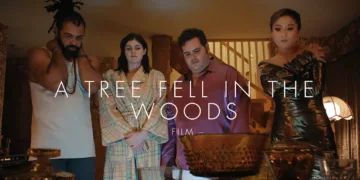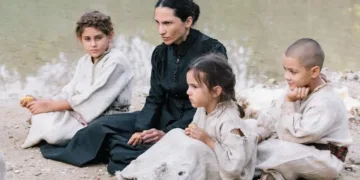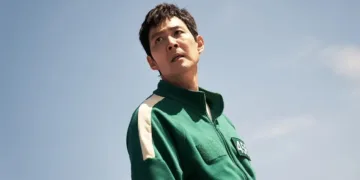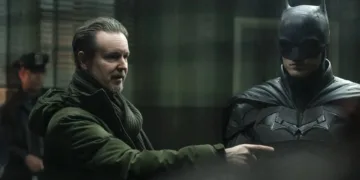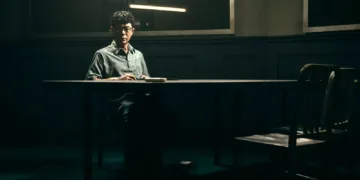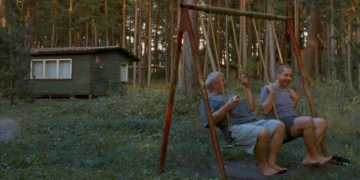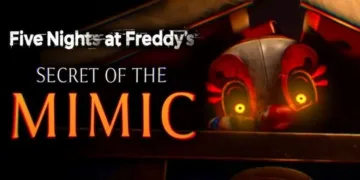There is a peculiar modern ritual: the flight of the urban professional to a cabin in the woods. It is sold as a restorative escape but functions more like a self-imposed exile, a minimalist tribunal where relationships are stress-tested under the guise of relaxation.
Nora Kirkpatrick’s A Tree Fell in the Woods opens with this exact pilgrimage, presenting two couples who believe they are merely celebrating the dead space between Christmas and New Year’s. We have the long-term best friends: Debs (Alexandra Daddario), a writer whose creative well has run dry, and Mitch (Josh Gad), a businessman whose affability masks a chasm of insecurity.
They are accompanied by their respective spouses, the egotistical photographer Josh (Daveed Diggs) and the effervescent cookbook author Melanie (Ashley Park). Their initial banter is a finely tuned performance of contentment, a fragile harmony that cannot possibly last. The universe, having a flair for the dramatic, sends a literal falling tree to nearly crush Debs and Mitch.
Rushing back from their near-death experience, they are granted a vision of a different kind of death: their partners entwined in an affair. As if on cue, a snowstorm descends, transforming the chic rental into a hermetically sealed chamber of resentment. The holiday is over. The hearing begins.
Four Faces of Quiet Desperation
The discovery of betrayal splits the wronged parties along a classic fault line: fight or flight. Debs, a woman whose professional inertia has clearly metastasized into personal rage, demands immediate, scorched-earth confrontation.
Hers is the fury of the stalled, an explosion of energy that has been denied a creative outlet. In contrast, Mitch advocates for a kind of strategic denialism. His plea to ignore the truth is not about forgiveness; it is about self-preservation. A man who openly believes he “won the lottery” by marrying Melanie, his entire sense of self-worth is tied to the union.
To acknowledge her infidelity is to acknowledge his own perceived inadequacy. He is terrified of the reality that he is not, in fact, a lottery winner but just another person holding a losing ticket. The film smartly dissects these anxieties, presenting the affair not as a genesis of conflict but as a mere accelerant.
Melanie’s aggressive cheerfulness is shown to be the brittle shell covering her own deep marital unhappiness. Josh’s photographer’s ego is revealed as the very thing that blinded him to his own failings. The cabin, with its exposed beams and wide windows, becomes a stage where there is no backstage to hide. Every word, every silence, echoes with the weight of years of unspoken disappointment.
In Vino Veritas, In Absinthio Absurdum
When conversation fails, chemistry must intervene. The narrative introduces its deus ex machina in the form of antique moonshine, a bootleg liquor from the cabin’s owner (a perfectly gruff Kevin Pollak) that functions as a potent truth serum.
This is, of course, a screenwriter’s contrivance, a shortcut to the third-act confessions that might otherwise take days of therapy to excavate. Yet, it works. The magical booze breaks the stalemate, dissolving inhibitions and allowing the film to pivot into a strange ballet of physical comedy and brutal honesty. Mitch drunkenly dancing with a floor lamp is absurd, but it is also the physical manifestation of a man completely untethered from his carefully constructed persona.
The ensuing confessions are the heart of the film’s argument. The affair, we learn, was a symptom of a much deeper pathology: profound, individual self-loathing. The film refuses to assign easy roles. Josh and Melanie are not simply villains; their betrayal was born from their own pain.
The narrative skillfully blurs the moral lines, suggesting that all four are complicit in the architecture of their collective misery. They are not just victims of each other, but of their own quiet compromises made over years.
The Sound of a Falling Self
Ultimately, A Tree Fell in the Woods is less concerned with the infidelity itself than with the personal reckonings it triggers. The central conflict is not between husband and wife but between each character and the life they have settled for. The film wisely declines to offer a neat resolution.
There is no tidy bow, no clear path forward for either couple. They are left in the wreckage, armed with a set of truths so painful that ignorance now seems like a lost luxury. Daddario’s performance captures this journey into raw-nerved awareness, while Gad offers a masterclass in weaponized meekness, showing how the “nice guy” can be its own form of tyranny.
The title’s philosophical question is answered with a shrug. A tree falls, a marriage implodes—the sound they make is irrelevant to the cosmos. What matters is the sound it makes to those standing nearby. Here, the sound is the shattering of the self-delusions that made their lives bearable.
It is a film that captures a distinctly modern anxiety: the terror of realizing you are halfway through a life you did not consciously choose, and the chaotic, often destructive, ways people try to prove they are still in control of the narrative.
A Tree Fell in the Woods premiered in the Spotlight Narrative section at the Tribeca Film Festival (June 4–15, 2025).
Full Credits
Director: Nora Kirkpatrick
Writers: Nora Kirkpatrick
Producers and Executive Producers: Lynette Howell Taylor, Samantha Housman, Nora Kirkpatrick, Nicolas Chartier, Jonathan Deckter, Brian Pitt, Sammy Rosenthal
Cast: Alexandra Daddario, Daveed Diggs, Josh Gad, Ashley Park
Director of Photography (Cinematographer): Jeff Leeds Cohn
Editor: Henry Hayes
Composer: Mitchell Yoshida
The Review
A Tree Fell in the Woods
A Tree Fell in the Woods is a sharp, uncomfortable chamber piece that uses its familiar setup to dissect the anxieties of modern relationships. While relying on a convenient narrative device, its incisive script and committed performances create a resonant study of how self-deception is the true infidelity. It's a film less about a broken marriage and more about the sound a broken soul makes when it finally hits the ground. It lingers not for its plot, but for the uncomfortable truths it forces to the surface.
PROS
- An intelligent script that explores deep psychological and philosophical themes.
- Strong, nuanced performances that elevate the material.
- Effectively captures a specific generational anxiety about life and relationships.
- Resists a simple resolution in favor of a more challenging, ambiguous ending.
CONS
- Relies on a contrived plot device (the "magic" moonshine) to force confessions.
- The "cabin in the woods" pressure-cooker setup feels familiar.
- Pacing can occasionally feel repetitive within the confined setting.
